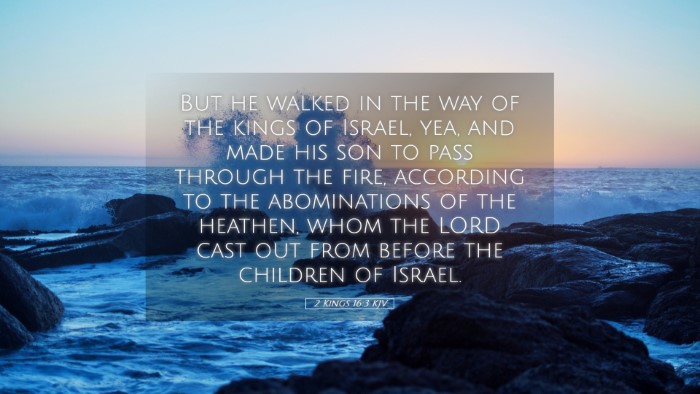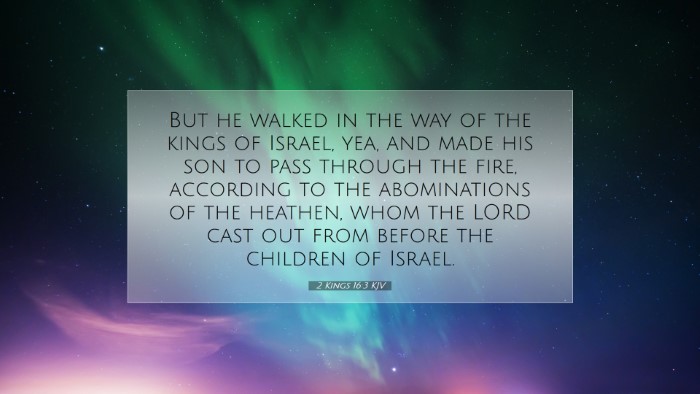Old Testament
Genesis Exodus Leviticus Numbers Deuteronomy Joshua Judges Ruth 1 Samuel 2 Samuel 1 Kings 2 Kings 1 Chronicles 2 Chronicles Ezra Nehemiah Esther Job Psalms Proverbs Ecclesiastes Song of Solomon Isaiah Jeremiah Lamentations Ezekiel Daniel Hosea Joel Amos Obadiah Jonah Micah Nahum Habakkuk Zephaniah Haggai Zechariah Malachi2 Kings 16:3
2 Kings 16:3 KJV
But he walked in the way of the kings of Israel, yea, and made his son to pass through the fire, according to the abominations of the heathen, whom the LORD cast out from before the children of Israel.
2 Kings 16:3 Bible Commentary
Commentary on 2 Kings 16:3
Bible Verse: "But he walked in the way of the kings of Israel, and made his son pass through the fire, according to the abominations of the heathen, whom the Lord cast out from before the children of Israel."
Contextual Background
The verse occurs during the reign of Ahaz, king of Judah. It is important to recognize the historical and theological context of the events described. Ahaz was a king who turned away from the worship of Yahweh and embraced the practices of the neighboring nations, particularly those of Israel, which God detested.
Exegesis and Commentary
This verse highlights Ahaz's apostasy and direct disobedience to God's commandments. The phrase “he walked in the way of the kings of Israel” indicates that Ahaz emulated the sinful practices of Israel's kings instead of adhering to the covenantal obligations established by God.
Walking in the Ways of Kings of Israel
Matthew Henry notes that Ahaz's actions were reminiscent of the idolatrous kings of Israel, suggesting that he sought political alliances over spiritual fidelity. His willingness to follow their example exhibits a disregard for the covenantal relationship with Yahweh.
- Idolatry: Ahaz embraced idolatry, an act condemned consistently throughout Scripture. By choosing the path of Israel, he rejected the exclusivity of Yahweh's worship.
- Political Expediency: In doing so, Ahaz aimed to strengthen his position against external threats such as Israel and Syria, which often comes at the cost of one's faithfulness to God.
Passing Through Fire
The phrase “made his son pass through the fire” is particularly troubling and points to child sacrifice. Albert Barnes elaborates on this, explaining that such rites were a part of the worship of Molech, a deity to whom children were sacrificed. This monstrous practice was viewed as a means of securing favor from the gods for prosperity and protection.
- Consequences of Idol Worship: The act of child sacrifice represents the depths of depravity that can arise from idolatry. Ahaz's actions demonstrate a complete moral breakdown.
- Judicial Accountability: This abandonment of righteousness leads to severe consequences as per the covenant stipulations, which included judgment against the nation for such abominations.
Theological Implications
Ahaz's reign serves as a cautionary tale regarding the dangers of syncretism, the blending of true worship with pagan practices. Adam Clarke emphasizes that "the ways of the kings of Israel" symbolize a broader spiritual decline that can occur when leaders choose pragmatism over divine mandate.
Leadership and Influence
The actions of leaders can significantly impact communal faith and practice. Pastors and theologians must recognize how the fidelity of leadership is crucial for maintaining a community’s commitment to God's commands.
- Responsibility of Leaders: Like Ahaz, contemporary leaders bear the responsibility to adhere to God's teachings and to guide others away from moral and spiritual compromise.
- Vulnerability to Cultural Pressures: The church must be vigilant against cultural influences that may dilute or corrupt biblical doctrine.
Application for Today
2 Kings 16:3 serves as a powerful reminder of the costs associated with turning away from God's standards. For students and scholars, the passage invites reflection on the nature of obedience and the possible ramifications of disobedience both personally and corporately.
- Personal Reflection: Individuals must examine areas of their lives where they may be tempted to conform to secular practices at the expense of their faith.
- Community Accountability: The church body is called to hold one another accountable in faithfulness, encouraging one another in the truth of Scripture.
Conclusion
As we reflect on the actions of Ahaz and the warning presented in 2 Kings 16:3, it becomes clear that faithfulness requires intentional choice and dedication to God’s word. The lessons drawn from Ahaz's reign should resonate deeply with those in pastoral roles, as they fulfill their calling to uphold and teach the tenets of faith in a world increasingly hostile to biblical truth.


